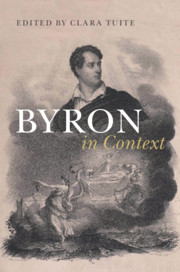Book contents
- Byron in Context
- Byron in Context
- Copyright page
- Dedication
- Contents
- Illustrations
- Contributors
- Chronology
- Abbreviations and Note on the Text
- Introduction
- Part I Life and Works
- Part II Political, Social and Intellectual Transformations
- Part III Literary Cultures
- Chapter 17 Classicism and Neoclassicism
- Chapter 18 Epic (and Historiography)
- Chapter 19 Romance
- Chapter 20 Byron’s Lyric Practice
- Chapter 21 Satire
- Chapter 22 The Satanic School
- Chapter 23 The Lake Poets
- Chapter 24 Byron’s Accidental Muse
- Chapter 25 “Benign Ceruleans of the Second Sex!”
- Chapter 26 The Pisan Circle and the Cockney School
- Chapter 27 Drama and Theater
- Chapter 28 Autobiography
- Chapter 29 “Literatoor” and Literary Theory
- Chapter 30 Periodical Culture, the Literary Review and the Mass Media
- Part IV Reception and Afterlives
- Further Reading
- Index
Chapter 24 - Byron’s Accidental Muse
Robert Southey
from Part III - Literary Cultures
Published online by Cambridge University Press: 04 October 2019
- Byron in Context
- Byron in Context
- Copyright page
- Dedication
- Contents
- Illustrations
- Contributors
- Chronology
- Abbreviations and Note on the Text
- Introduction
- Part I Life and Works
- Part II Political, Social and Intellectual Transformations
- Part III Literary Cultures
- Chapter 17 Classicism and Neoclassicism
- Chapter 18 Epic (and Historiography)
- Chapter 19 Romance
- Chapter 20 Byron’s Lyric Practice
- Chapter 21 Satire
- Chapter 22 The Satanic School
- Chapter 23 The Lake Poets
- Chapter 24 Byron’s Accidental Muse
- Chapter 25 “Benign Ceruleans of the Second Sex!”
- Chapter 26 The Pisan Circle and the Cockney School
- Chapter 27 Drama and Theater
- Chapter 28 Autobiography
- Chapter 29 “Literatoor” and Literary Theory
- Chapter 30 Periodical Culture, the Literary Review and the Mass Media
- Part IV Reception and Afterlives
- Further Reading
- Index
Summary
My chapter takes our old friend Southey as a new “context” for Byron: not the well-known target of satiric abuse, but in surprises of sympathy, as an accidental muse for Byron’s voice. This may seem ultra-counterintuitive for the famous butt of brutal, hilarious Byronic ridicule. The debut was English Bards and Scotch Reviewers (begun October 1807, published 1809): hailing the poet of ponderous Epics (CPW I: 230, l. 25), the relentless Ballad-monger, the plodding long-winded Bard (CPW I: 231–3, ll. 86–118). Southey wasn’t the lone star in the abuse. It was a constellation, including Lakers Wordsworth and Coleridge. The irritation of Wordsworth’s poetry was sharpened in the Regency for Byron by Wordsworth himself, his Tory-turn thanked with a patronage post. As for Coleridge, Byron apologized in 1815 for the “pert, petulant, and shallow” satire in English Bards (BLJ 4: 286), and stayed true to the best of the poet. Coleridge would stand by his Lordship in the Byrons’ separation scandal of 1816, with an essay in the April 18 Courier (unsigned, the author was legible to Byron). Rapt by the “pathos and tenderness” of Byron’s “Fare Thee Well” to Lady Byron (privately circulated, quickly pirated), Coleridge defended its “touching and affecting” verses against charges of “affectation” and “hypocrisy.” Byron had helped him financially, supported his playwriting, and persuaded John Murray (his own publisher) to issue a slim volume of Coleridge’s poetry. This came out in May, leading with Christabel, the poem Wordsworth rejected, years ago, for Lyrical Ballads. Byron had read it in manuscript and praised it in an endnote in The Siege of Corinth (1816, 56). After it was roasted in the reviews, he defended it vigorously to Murray and others (BLJ 5: 108). Among them was Thomas Moore (BLJ 5: 150), whom Byron nudged for a favorable notice in the Edinburgh Review. Moore obliged, but hardly with favor (ER 27, September 1816, 58–67). When in 1819 Byron drafted a satirical “Dedication” of Don Juan to Southey, he let Coleridge off with a friendly jest just about his prose: “Explaining metaphysics to the nation – / I wish he would explain his Explanation” (DJ, Dedication, II. 15–16).
- Type
- Chapter
- Information
- Byron in Context , pp. 197 - 205Publisher: Cambridge University PressPrint publication year: 2019



